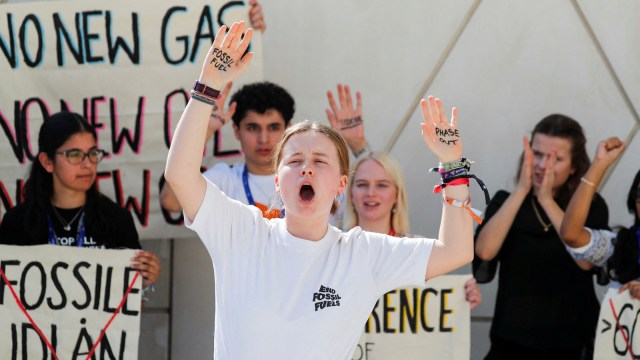Express at COP28: Nations strike climate deal to transition away from fossil fuels
The countries agreed to contribute towards tripling global renewable energy capacity and doubling the current annual rate of energy efficiency improvements by 2030.
 Johanne Clara Duvigneau, a climate activist leads a protest against fossil fuel at Dubai's Expo City during the United Nations Climate Change Conference (COP28) in Dubai. (Reuters)
Johanne Clara Duvigneau, a climate activist leads a protest against fossil fuel at Dubai's Expo City during the United Nations Climate Change Conference (COP28) in Dubai. (Reuters)Countries at COP28 meeting in Dubai struck a new climate deal on Wednesday that included a mention of a transition away from fossil fuels for the first time and operationalised a loss and damage fund that is meant to provide financial help to developing countries in recovering from climate disasters.
The countries agreed to contribute towards tripling global renewable energy capacity and doubling the current annual rate of energy efficiency improvements by 2030, two measures that are considered key to keeping alive hopes of restricting temperature rise within 1.5 degree Celsius. They also agreed to accelerate the deployment of “zero and low-emission technologies” like renewables, nuclear, and carbon capture and storage.
A tougher language on fossil fuels, calling for its “phase-out”, could not be agreed upon and had to be changed to “transition away from fossil fuels”.
The Association of Small Island States, a group of island countries that face the worst impacts of climate change, could not hide its disappointment. “The course corrections that were needed have not been secured. We have made incremental advancement over business as usual, when what we really needed was an exponential leap in our actions and support,” said the negotiator from Samoa, a small island country in the Pacific, who received a loud applause in response.
Others too acknowledged that the agreement stopped far short of their expectations but welcomed it as a step forward.
This is the first time in the nearly 30 years of climate negotiations that fossil fuels have even been mentioned in any of the outcome documents. The agreement calls all countries to contribute to global efforts towards “transitioning away from fossil fuels in energy systems, in a just, orderly and equitable manner” and also in “phasing out inefficient fossil fuel subsidies that do not address energy poverty or just transitions”.
India’s concerns on coal phase-down have also been addressed. The final agreement retains the language used in the 2021 conference in Glasgow. It asks countries to contribute towards “accelerating efforts towards the phase-down of unabated coal power”.
An earlier draft had sought to put additional restrictions on the launch of new coal-fired power plants, but that was resisted by countries like India, South Africa and China.




- 01
- 02
- 03
- 04
- 05



























